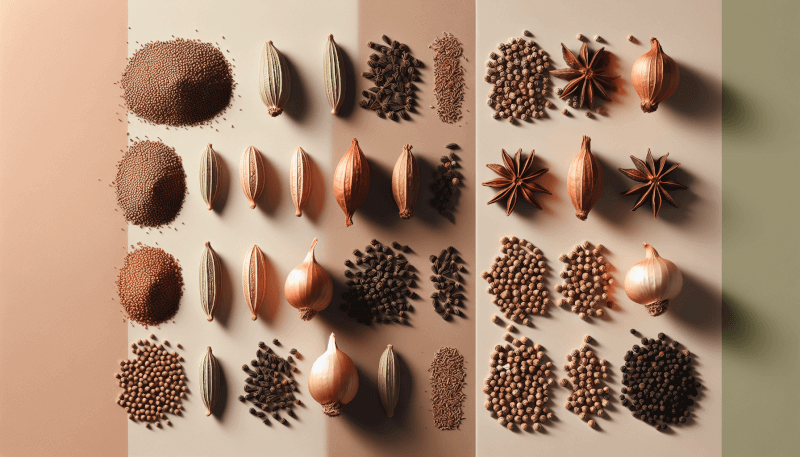If you’re a cooking enthusiast looking to add some flavorful variety to your dishes, you might find yourself torn between two aromatic powerhouses: cumin seeds and coriander seeds. Both these tiny seeds pack a punch when it comes to enhancing the taste and aroma of your favorite recipes, but they also boast unique characteristics that set them apart. In this article, we’ll explore the distinct qualities of cumin seeds and coriander seeds, helping you decide which one deserves a prominent place in your spice cabinet. So, get ready to embark on a flavorful journey as we compare cumin seeds versus coriander seeds.
Flavor
Cumin Seeds Flavor
Cumin seeds have a distinct, warm, and earthy flavor. They are known for their strong aroma, which is often described as smoky and peppery. Cumin seeds add depth and complexity to dishes with their slightly bitter and nutty taste. They have a warm spiciness that enhances the overall flavor profile of the dish. Cumin seeds are commonly used in savory recipes, particularly in Indian, Mexican, and Middle Eastern cuisines.
Coriander Seeds Flavor
Coriander seeds have a unique flavor that is both citrusy and slightly sweet. They have a floral and slightly spicy taste with hints of lemon and orange. Coriander seeds contribute a bright and fresh flavor to dishes, making them a popular choice in various cuisines around the world. They complement both sweet and savory recipes and are often used in spice blends and marinades. Coriander seeds are an essential ingredient in Indian, Thai, and Mediterranean dishes.
Appearance
Cumin Seeds Appearance
Cumin seeds are small and oblong in shape with a distinctive pale brown color. They have a slightly wrinkled texture and can sometimes appear dusty. Cumin seeds are harvested from the fruit of the Cuminum cyminum plant and are about 4-5 mm in length. They have a hard outer shell that encases their aromatic oils and flavors.
Coriander Seeds Appearance
Coriander seeds are round and slightly oval in shape, with a light brown color. They have a smooth texture and are slightly larger than cumin seeds, measuring around 5-6 mm in diameter. The seeds are harvested from the dried fruit of the Coriandrum sativum plant. Coriander seeds have a shiny exterior and a slightly ridged surface.
Uses in Cooking
Cumin Seeds in Cooking
Cumin seeds are an essential ingredient in many cuisines around the world. They are commonly used in spice blends, such as curry powder, garam masala, and chili powder. Cumin seeds are often dry-roasted before being ground to release their full flavor. They are also commonly used in tempering, where they are fried in oil or ghee to infuse their aromatic oils into the dish. Cumin seeds are used in a variety of dishes, including soups, stews, curries, rice, and bread.
Coriander Seeds in Cooking
Coriander seeds are versatile and widely used in various culinary applications. They are an integral part of many spice blends, including garam masala, Chinese five spice, and berbere. Coriander seeds can be used whole or ground, depending on the recipe. They are often dry-roasted to enhance their flavor and then ground into a fine powder. Coriander seeds are used in curries, marinades, pickles, baked goods, and even beverages like tea and cocktails.
Nutritional Profile
Cumin Seeds Nutritional Profile
Cumin seeds are not only flavorful but also packed with essential nutrients. They are a good source of vitamins and minerals, including iron, manganese, and calcium. Cumin seeds are also rich in antioxidants, which can help protect against oxidative stress and inflammation in the body. Additionally, they contain dietary fiber, protein, and healthy fats. Cumin seeds are low in calories, making them a nutritious addition to your diet.
Coriander Seeds Nutritional Profile
Coriander seeds are not only aromatic but also offer various nutritional benefits. They are a good source of dietary fiber, which aids in digestion and helps maintain a healthy digestive system. Coriander seeds also contain vitamins and minerals, including vitamin C, vitamin K, and potassium. Like cumin seeds, coriander seeds are rich in antioxidants that help fight free radicals and reduce inflammation.
Health Benefits
Cumin Seeds Health Benefits
Cumin seeds have been valued for their potential health benefits for centuries. They have antibacterial and antifungal properties that can help fight infections. Cumin seeds may also aid in digestion by promoting the production of enzymes that assist in breaking down food. Additionally, cumin seeds have been associated with lowering cholesterol levels, improving blood sugar control, and reducing inflammation in the body. These health benefits make cumin seeds a valuable addition to a balanced diet.
Coriander Seeds Health Benefits
Coriander seeds are not only beneficial for flavoring dishes but also for promoting overall health. They have been traditionally used to aid digestion and relieve digestive issues such as bloating and indigestion. Coriander seeds may have antimicrobial properties and can help fight against harmful bacteria. They have also been studied for their potential cholesterol-lowering effects and may contribute to heart health. Furthermore, coriander seeds may possess anti-inflammatory properties, making them a valuable ingredient in maintaining overall well-being.
Medicinal Properties
Cumin Seeds Medicinal Properties
Cumin seeds have long been recognized for their medicinal properties. They have antimicrobial and anti-inflammatory effects, which can help combat infections and reduce inflammation in the body. Cumin seeds may also have antidiabetic properties, as they can help regulate blood sugar levels. Additionally, they have been used traditionally to alleviate symptoms of respiratory conditions, such as asthma and bronchitis. Cumin seeds are a versatile spice that not only adds flavor to dishes but also provides potential health benefits.
Coriander Seeds Medicinal Properties
Coriander seeds possess several medicinal properties and have been used in traditional medicine for various purposes. They have been valued for their anti-inflammatory and analgesic properties, which may help alleviate pain and reduce inflammation. Coriander seeds are also believed to have antimicrobial effects that can help fight against bacteria and fungi. Additionally, they are considered to have diuretic properties, promoting urine flow and assisting in detoxification. The medicinal properties of coriander seeds make them a valuable natural remedy.
Culinary Uses
Cumin Seeds Culinary Uses
Cumin seeds are widely used in cooking and add a distinctive flavor to a variety of dishes. They are commonly used in Indian cuisine, where they are a key ingredient in curries, dal, and spice blends like garam masala. Cumin seeds are also used in Mexican dishes, such as chili powder and taco seasonings. They can be sprinkled on roasted vegetables, added to soups and stews for depth of flavor, or used as a spice rub for meats. The versatility of cumin seeds makes them an essential pantry staple in many kitchens worldwide.
Coriander Seeds Culinary Uses
Coriander seeds are a versatile spice that is used in various cuisines globally. They are a key component in Indian curries, Thai green curry paste, and Moroccan spice mixes like ras el hanout. Coriander seeds can be ground and used to flavor baked goods, such as bread and cookies. They are also commonly used to add a citrusy flavor to pickles, chutneys, and marinades. Additionally, coriander seeds can be infused in oils or used to make homemade spice blends. The culinary uses of coriander seeds are endless and can elevate the flavor of any dish.
Traditional Medicine
Cumin Seeds Traditional Medicine
In traditional medicine, cumin seeds have been used for their medicinal properties. They have been believed to aid digestion, alleviate gastrointestinal issues, and reduce flatulence. Cumin seeds have also been used as a natural remedy for respiratory conditions like asthma and bronchitis. Additionally, they have been valued for their potential to increase lactation in nursing mothers. While these traditional uses may have anecdotal support, it is important to consult with a healthcare professional for appropriate guidance and treatment.
Coriander Seeds Traditional Medicine
Coriander seeds have a long history of use in traditional medicine. They have been believed to have digestive properties and have been used to alleviate gastrointestinal complaints, such as bloating and indigestion. Coriander seeds have also been used as a diuretic and have been associated with promoting kidney health. In traditional medicine practices, they have been used to treat various ailments, including urinary tract infections and menstrual irregularities. However, it is important to note that further scientific research is needed to fully understand and validate these traditional uses.
Cuisine
Cumin Seeds in Cuisine
Cumin seeds play a vital role in several cuisines worldwide, adding depth of flavor and richness to dishes. They are an integral part of Indian, Mexican, Middle Eastern, and North African cuisines. In Indian cuisine, cumin seeds are featured in dishes like biryani, curry, and dal. Mexican cuisine relies heavily on cumin seeds in chili powder and taco seasonings, adding a smoky and savory flavor. In Middle Eastern and North African cuisines, cumin seeds are used in various spice blends and dishes like falafel and couscous. Cumin seeds are a crucial ingredient that brings authenticity and complexity to these culinary traditions.
Coriander Seeds in Cuisine
Coriander seeds are widely utilized in numerous cuisines, enhancing the flavor profiles of dishes across different cultures. They are a staple in Indian cuisine, where they are used in curries, chutneys, and spice blends. In Thai cuisine, coriander seeds are featured in green curry paste, adding a fresh and aromatic touch. In Mediterranean and Middle Eastern cuisines, coriander seeds are used in spice blends like za’atar and ras el hanout, as well as in marinades and pickles. Coriander seeds are highly valued for their versatility and ability to elevate the taste of various dishes.
Comparison
Comparison of Cumin Seeds and Coriander Seeds
Cumin seeds and coriander seeds are both popular spices that add distinct flavors to dishes. While they have different taste profiles, they complement each other well and can often be found together in spice blends and recipes.
In terms of flavor, cumin seeds have a warm and earthy taste with a hint of smokiness, while coriander seeds have a citrusy and slightly sweet flavor with floral undertones. Cumin seeds have a more pronounced and robust flavor, while coriander seeds offer a lighter and fresher taste.
In appearance, cumin seeds are small and oblong with a pale brown color, while coriander seeds are rounder and slightly larger with a light brown shade. Both seeds have distinct textures, with cumin seeds being slightly wrinkled and coriander seeds having a smooth exterior.
In cooking, both cumin seeds and coriander seeds are widely used in numerous cuisines. However, cumin seeds are commonly found in Indian, Mexican, and Middle Eastern dishes, while coriander seeds are popular in Indian, Thai, and Mediterranean cuisines. Cumin seeds are often dry-roasted and used as a seasoning or spice rub, while coriander seeds are used whole or ground in both savory and sweet recipes.
Nutritionally, both seeds offer various health benefits and are rich in antioxidants. Cumin seeds are a good source of iron, manganese, and calcium, while coriander seeds provide dietary fiber, vitamin C, and potassium.
In terms of traditional medicine, both cumin seeds and coriander seeds have been valued for their potential medicinal properties. Cumin seeds have been used traditionally to aid digestion and respiratory conditions, while coriander seeds have been believed to promote digestion and urinary tract health.
Overall, both cumin seeds and coriander seeds are versatile and flavorful spices that can enhance the taste of a wide range of dishes. Incorporating these spices into your cooking not only adds depth and complexity but also offers potential health benefits.




